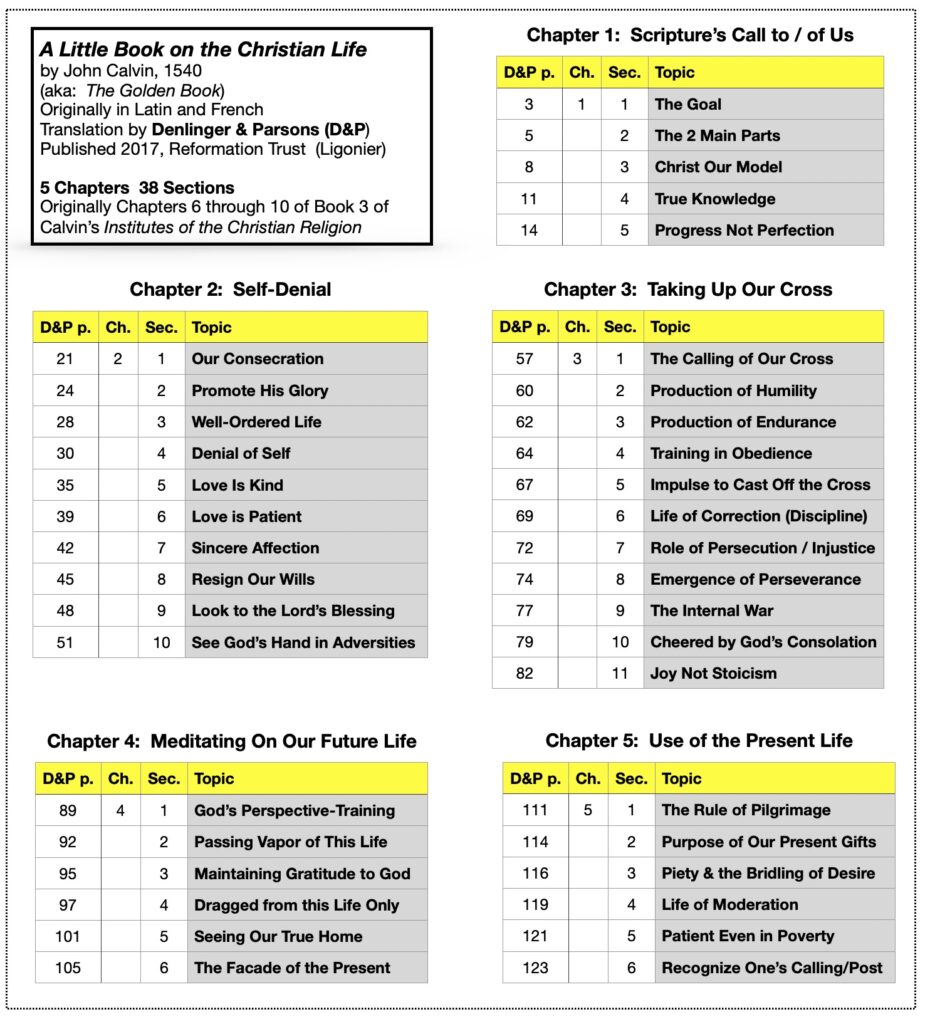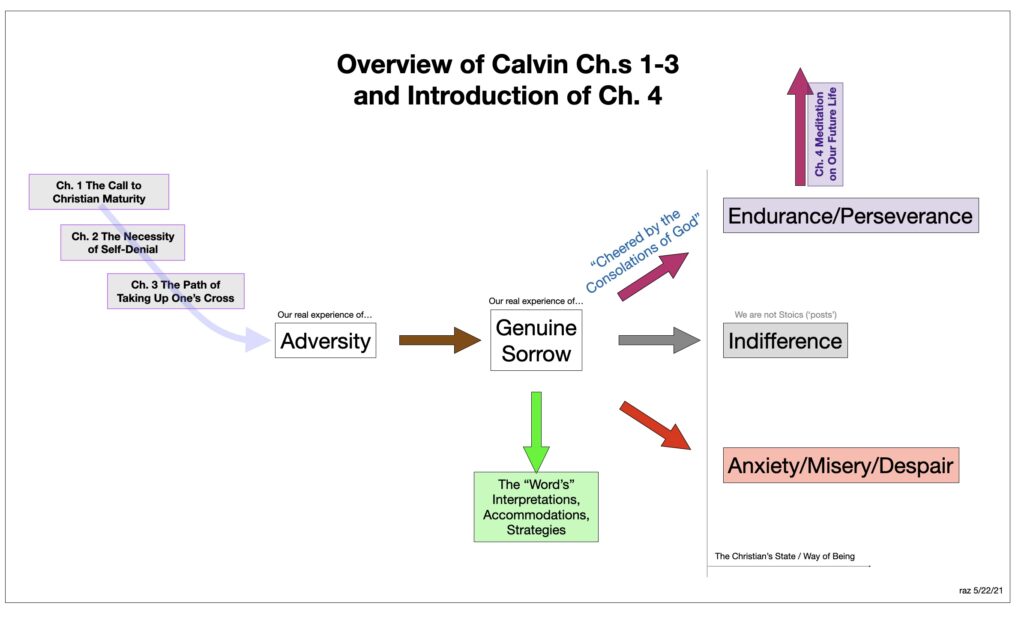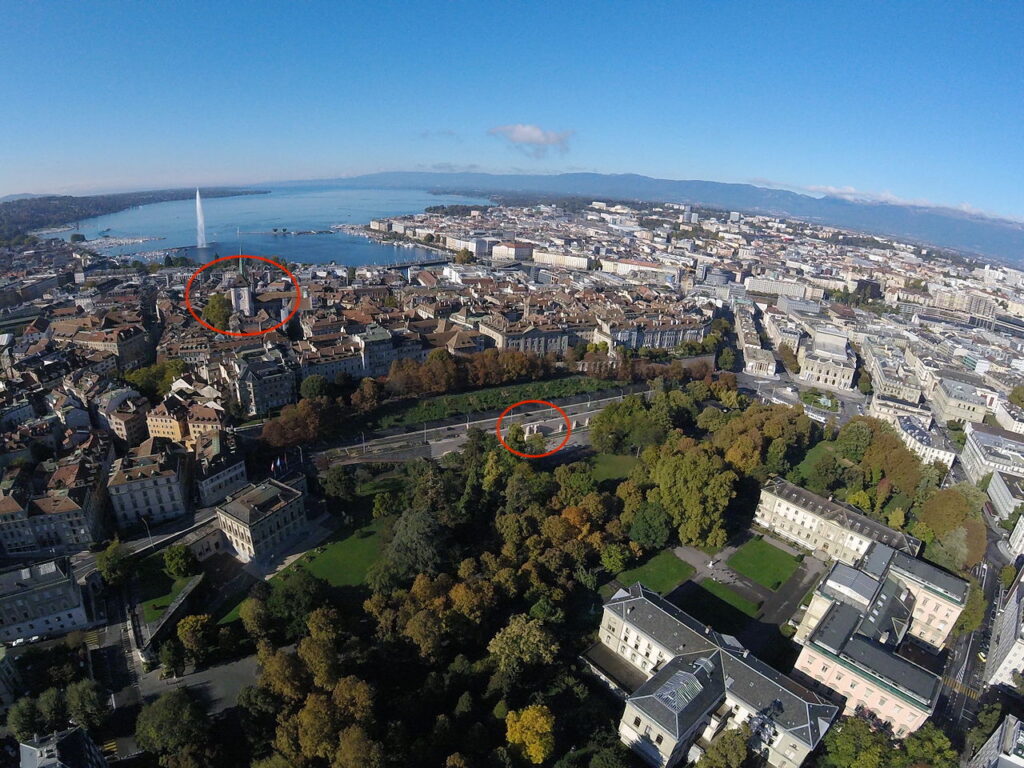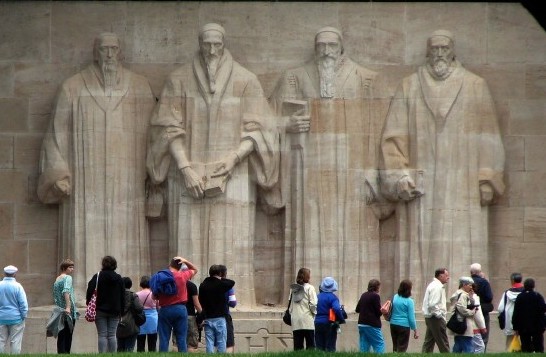We will use this week to review the territory we’ve covered in the 26 Sections of Calvin’s Chapters 1-3. Additionally we will connect the central point of Calvin’s “Little Book” with the key doctrinal concept of “sanctification.”
Maps of Calvin’s Little Book


The photograph below of modern Geneva Switzerland shows the medieval city where Calvin ministered for most of his adult life and where he wrote his Institutes of the Christian Religion from which the “Little Book” is taken.
The body of water at the top of the image is Lake Geneva, headed by its famous fountain. The red circle just below the fountain is the church named in honor of St Peter in Geneva, not to be confused with the Roman Catholic church of that same name that is part of the Vatican in Rome. This St Peter church is quite modest in size, and is much older (built in 1160-1260), and is sited on a very early, perhaps 3rd or not later than 6th Century, church foundation. It is where Calvin wrote and taught from 1536 to his death in 1563 with a brief ‘exile’ of several years (The Political Industry, TPI, of the time threw him out of the city for a time, but then invited him back).
Not readily discernible in the picture is that the church building sits at the crest of a hill in what is known today as the old city. The red circle on the lower right is the Reformation Monument honoring–which Calvin would not have wanted–the four contemporaries who ministered there as key figures in the Reformation: Ferel (1489-1565), Calvin (1509-1563), Knox (1514-1572), and Beza (1519-1605). At the bottom of the photograph, below the Reformation Monument, is the University of Geneva, which was founded in 1559 by Calvin and Beza, more than 60 years before the founding of Harvard College, the oldest university in the United States. The University of Geneva then, as was Harvard at its founding, a theological seminary for the purpose of preparing scholars, teachers, preachers, and evangelists of the Bible.

The left-to-right order of the Reformation Wall Monument, shown in the photograph below, is Farel, Calvin, Beza, and Knox. John Knox later played a key role in establishing the reformation in Scotland. Theodore Beza was a great scholar of the original languages of the Bible; he published several important editions of the New Testament Koine Greek Bible. Beza owned a 5th century mss of Koine Greek and Latin, a so-called diglot, which he donated to Cambridge University in 1581, where it is preserved to this day; it can be viewed here: Beza’s Greek and Latin mss and translations were used by the translators of the KJV Bible.
Interesting side note: a Paris printer named Robert Estienne, aka “Stephanos,” moved his printing operations to Geneva (likely because of the persecution of the strong Roman Catholic presence in France), and printed Beza’s and other important works including the famed Geneva Bible of 1560. In the course of such printing, it was Estienne (Stephanos) who created all the 31,000 verses we now have that organizes our Bibles. Prior to that time, the Bible had only been divided into books and, beginning in ca. 1000 A.D., the 1189 chapters as we still have it today. The English translation of the Geneva Bible became the standard translation used by the Puritans in America, and by Shakespeare, John Milton, John Bunyan and many many others. It pre-dates and was largely the basis of the Authorized Version (AV), aka The King James Version (1611). The Geneva Bible was also the first “study Bible,” as it included many notes to aid the reader (and which notes were found objectionable to TPI and TRI of England which was a principal impetus for it to create a government-authorized Bible, the KJV).

A pdf of the 1560 Geneva Bible in its original now archaic English is available here:
A more accessible English text of the 1599 update of the 1560 Geneva Bible is available here: A special feature of such cite is the “Interlinear” option that shows multiple Koine (Greek) source texts and multiple English traditional translations (“traditional” in the sense such translations are based on the “texts receptus,” which means, approximately, the exclusive use of Koine mss as collected shortly after the completion of the KJV translation, and not the so-called “critical texts” developed from mss discoveries beginning in the late 18th Century).
Below is a pdf of such interlinear feature for the verse we will consider below on this page, Hebrews 1:3:
Sanctification
“Sanctification” is one of the pillars of Theology. It is connected with another foundational term–Justification–in an important way, that divides many followers of Christ.
The Reformation view, and the Bible’s clear teaching, is that Sanctification follows Justification, because Justification occurs only by God’s Sovereign raising the dead in sin. The opposing view, which has been in conflict with what has just been stated is that “justification” is the deserved / earned outcome of a life of continual “sanctification.” The line of separation between these opposing is somewhat blurred by many of the second view holding that “sanctification” can only occur because of the Work of God (The Holy Spirit), and so “the credit” is not really (all / solely) man’s. However, there remains an important line of separation because this second view is that man necessarily initiates sanctification by his first act of faith, perhaps because only his mind was “dead,” and not his will, or not all of his will, or perhaps (and this is the Roman Catholic doctrine) there was a “prevenient grace” which enabled, but did not compel, faith to arise from an incompletely fallen “will,” thus the launching the opportunity but not the guarantee of a life of sanctification ending worthy of entering (after “purgatory”) the eternal realm of heaven. There are other distinctions, of course, such as the significance of “the sacraments” and “the church” in enabling / causing such sanctification.
What we wish to highlight here because of its central importance in understanding Calvin’s “Little Book” is that Calvin, and the Reformers, hold to the doctrine that “Justification” occurs first, and the never ending process (in this life) of Sanctification, follows.
The Reformation which began, arguably, in 1517 with Luther’s posting of his 95 Theses, and grew mightily in the later years of the 16th Century led in many ways by the Geneva Reformers and Calvin’s publication of the Institutes, grew / matured into the 17th Century culminating in a series of great “Confessions.” These confessional documents are, principally: The Westminster (WCF, 1647), The Savory (SDFO, 1658), the London Baptist (LBCF, 1680), and The Philadelphia (PCF, 1742). I have discussed this more fully here:
The subject of Sanctification is dealt with succinctly, precisely, and beautifully in Chapter 13 of each of these Confessions as shown below:
| WCF — Chapter XIII: Of Sanctification | SDFO — Chapter XIII: Of Sanctification | LBCF/PCF — Chapter XIII: Of Sanctification |
|---|---|---|
| 1. They who are effectually called and regenerated, having a new heart and a new spirit created in them, are further sanctified, really and personally, through the virtue of Christ’s death and resurrection, by his Word and Spirit dwelling in them; the dominion of the whole body of sin is destroyed, and the several lusts thereof are more and more weakened and mortified, and they more and more quickened and strengthened, in all saving graces, to the practice of true holiness, without which no man shall see the Lord. | 1. They that are united to Christ, effectually called and regenerated, having a new heart and a new spirit created in them, through the virtue of Christ’s death and resurrection, are also further sanctified really and personally through the same virtue, by his Word and Spirit dwelling in them; the dominion of the whole body of sin is destroyed and the several lusts thereof are more and more weakened, and mortified, and they more and more quickened, and strengthened in all saving graces, to the practice of all true holiness, without which no man shall see the Lord. | 1. They who are united to Christ, effectually called, and regenerated, having a new heart and a new spirit created in them through the virtue of Christ’s death and resurrection, are also farther sanctified, really and personally, through the same virtue, by His Word and Spirit dwelling in them; the dominion of the whole body of sin is destroyed, and the several lusts thereof are more and more weakened and mortified, and they more and more quickened and strengthened in all saving graces, to the practice of all true holiness, without which no man shall see the Lord. |
| 2. This sanctification is throughout in the whole man, yet imperfect in this life: there abideth still some remnants of corruption in every part, whence ariseth a continual and irreconcilable war, the flesh lusting against the Spirit, and the Spirit against the flesh. | 2. This sanctification is throughout in the whole man, yet imperfect in this life; there abideth still some remnants of corruption in every part; whence ariseth a continual and irreconcilable war, the flesh lusting against the Spirit, and the Spirit against the flesh. | 2. This sanctification is throughout the whole man, yet imperfect in this life; there abideth still some remnants of corruption in every part, whence ariseth a continual and irreconcilable war; the flesh lusting against the Spirit, and the Spirit against the flesh. |
| 3. In which war, although the remaining corruption for a time may much prevail, yet, through the continual supply of strength from the sanctifying Spirit of Christ, the regenerate part doth overcome: and so the saints grow in grace, perfecting holiness in the fear of God. | 3. In which war, although the remaining corruption for a time may much prevail, yet through the continual supply of strength froin the sanctifying Spirit of Christ, the regenerate part doth overcome, and so the saints grow in grace, perfecting holiness in the fear of God. | 3. In which war, although the remaining corruption for a time may much prevail, yet through the continual supply of strength from the sanctifying Spirit of Christ, the regenerate part doth overcome; and so the saints grow in grace, perfecting holiness in the fear of God, pressing after an heavenly life, in evangelical obedience to all the commands which Christ as Head and King, in His Word hath prescribed them. |
Why is this treatment of Sanctification relevant here? In essence, Calvin’s “Little Book” summarizes in very practical terms what the process and experience of Sanctification is in the life of Justified believers. Justification comes first, and alone by Grace. This is made very clear in Calvin’s Institutes, but not completely in the five excerpted chapters of his Little Book we are using here. Of course the objection that is raised against this belief is that a man can express faith, and so give evidence of his “Justification,” but then live a life of no evidence that any such encounter with God’s Grace has taken place; the Epistle to the Hebrews, especially its Chapter 6, makes clear that such a life was never so “justified.” As Luther said of “Faith”–we are saved by faith alone but not a faith that is alone (i.e., dead)–can be directly applied to Justification, namely justification comes first, and alone by God’s Providential Grace, but it is not the end (the telos), but the beginning.
Hebrews 1:3 and Hebrews Ch 12
As I will address in a separate post, but repeat briefly here, the opening verses of the Epistle to the Hebrews makes absolutely clear to that audience, the Jewish people of the New Testament (NT) period, that following the Mosaic Law did not, could not, and would not ever lead to “Justification,” because by no work(s) of the flesh, including so-thought-to-be Law-following, can any man be justified, however dedicated or (appearing or believing to be) sincere. The Law condemns us all, and makes us ready to grasp the need for a Savior outside of ourselves, extra nos.
Consider Hebrews 1:3 given below:
3 He is the radiance of the glory of God and the exact imprint of his nature, and he upholds the universe by the word of his power. After making purification for sins, he sat down at the right hand of the Majesty on high,
Hebrews 1:3 (ESV, highlights mine: bold = are the 3 participles; underline = the one verb
There are so many wonderful dimensions of the above verse. Here we will focus only on the three participles and the one, main verb. The participles are identified by the bold font and the main verb by the underlining.
The first two participles are in the present “tense” (aka “aspect”). The most English-literal translations would be: “He, Being the radiance of…,” and “He upholding the universe…” Participles are verbs that are used as nouns, which often are formed in English by the -ing ending of word (but not exclusively so). The present tense (or aspect) is contrasted with the third participle–“making purification for sins”—which is in the Aorist tense (more on that tense below). The one verb, translated by two words–“sat down“–is also in the Aorist tense.
The Aorist tense can be considered the designation of a single, one-time, past act, such as “Fred was born in England.” Fred is only going to be born once (physically), so the Aorist tense in Koine is proper. However, modern scholarship stresses, over-stresses in my simple view, that the Aorist tense should not be primarily considered as a time marker but rather a whole event designation without a time element. So our example with Fred such view would so understand the word “born” in the Aorist form as signifying the notable news is that he was born and not that it was in the past, or that it was a one-time thing.
However, one-time past, and big-single event perspectives often coalesce as with Fred and much more significantly with the Koine verb “sat down” in Hebrews 1:3. It is the clear teaching of the Epistle that Christ’s sacrifice was a one-time, completed event, and from the perspective post-Resurrection that must be a one-time past event.
The Epistle to the Hebrews develops this line of understanding throughout the text. Consider this passage below from Chapter 9:
24 For Christ has entered, not into holy places made with hands, which are copies of the true things, but into heaven itself, now to appear in the presence of God on our behalf. 25 Nor was it to offer himself repeatedly, as the high priest enters the holy places every year with blood not his own, 26 for then he would have had to suffer repeatedly since the foundation of the world. But as it is, he has appeared once for all at the end of the ages to put away sin by the sacrifice of himself. 27 And just as it is appointed for man to die once, and after that comes judgment, 28 so Christ, having been offered once to bear the sins of many, will appear a second time, not to deal with sin but to save those who are eagerly waiting for him.
Hebrews 9 (ESV, emphasis mine, highlighting “once”)
So it is at Heb. 1:3 that we have the Aorist tense telling us that Christ “sat down” to signify the once and for all completed event of the payment for sin.
Now back to the three participles. The first two as noted are in the present tense, whereas the third is in the same Aorist tense as the main verb. The usual rule of interpretation is that such Aorist tense participle–which is here “making purification for sins…”–is likewise a one time event, which maybe obscured by the use of the word “making” in English that could suggest that such is an ongoing, never ending act. However, it is the first two participles that are in the present tense, “Being” and “upholding,” which rightly conveys the ever active, always present situation, namely Christ “Being the radiance of the glory of God” was, is and always will be the present situation, as is His “upholding.” So a better translation of this third participle is “made purification” where “made” is not a verb but a participle, a distinction not readily noted in English.
Note that the ESV reference to “the universe” as the object of Christs “upholding” is not a translation of any Koine mss word “universe;” the original mss says He is “upholding the all” (the all is “ta panta” which is literally “the all”). So whatever succeeds the present Creation upon the New Heavens and the New Earth will still be “ta panta,” but perhaps not “the universe” as we presently understand our physical place to be.
Returning now to Justification and then Sanctification claim, the above Heb. 1:3 verse is but a single example out of many possible texts gives us clarity as to God’s one-time completed satisfaction (“propitiation”) as the the sin debt we each carry from Adam and our own nature. We never reduce such debt, let alone eliminate it, by some lifetime of piety, even perfect piety (which of course would not even be possible). The debt has been paid for those for whom it has been paid. Now what?
Let’s consider further the chain of reasoning in the Hebrews Epistle, namely its Ch 12:
12 Therefore, since we are surrounded by so great a cloud of witnesses, let us also lay aside every weight, and sin which clings so closely, and let us run with endurance the race that is set before us, 2 looking to Jesus, the founder and perfecter of our faith, who for the joy that was set before him endured the cross, despising the shame, and is seated at the right hand of the throne of God.
3 Consider him who endured from sinners such hostility against himself, so that you may not grow weary or fainthearted. 4 In your struggle against sin you have not yet resisted to the point of shedding your blood. 5 And have you forgotten the exhortation that addresses you as sons?
“My son, do not regard lightly the discipline of the Lord,
nor be weary when reproved by him.
6 For the Lord disciplines the one he loves,
and chastises every son whom he receives.”7 It is for discipline that you have to endure. God is treating you as sons. For what son is there whom his father does not discipline? 8 If you are left without discipline, in which all have participated, then you are illegitimate children and not sons. 9 Besides this, we have had earthly fathers who disciplined us and we respected them. Shall we not much more be subject to the Father of spirits and live? 10 For they disciplined us for a short time as it seemed best to them, but he disciplines us for our good, that we may share his holiness. 11 For the moment all discipline seems painful rather than pleasant, but later it yields the peaceful fruit of righteousness to those who have been trained by it.
12 Therefore lift your drooping hands and strengthen your weak knees, 13 and make straight paths for your feet, so that what is lame may not be put out of joint but rather be healed. 14 Strive for peace with everyone, and for the holiness without which no one will see the Lord. 15 See to it that no one fails to obtain the grace of God; that no “root of bitterness” springs up and causes trouble, and by it many become defiled; 16 that no one is sexually immoral or unholy like Esau, who sold his birthright for a single meal. 17 For you know that afterward, when he desired to inherit the blessing, he was rejected, for he found no chance to repent, though he sought it with tears.
Hebrews Ch 12 (ESV)
The order of revelation in the Epistle is important. The above chapter clearly occurs as a concluding admonition, in Ch 12 of its 13 chapters, exactly as Romans 12, Ephesians 4, and Colossians 3 are positioned: after the indicatives (verb forms that are statements of fact, including the fact of our completed redemption and new birth) then are given the imperatives (the verb forms of commandments for being, doing, going–consistent with and deriving from the indicatives preceding).
Martyn Lloyd Jones on Sanctification re Justification
Martyn Lloyd Jones (MLJ) taught a 12-year, Friday evening study of the Epistle to the Romans, in the mid-1900s, at Westminster Chapel in London.
In his commentary on various texts of Romans Chapter 8, he makes extensive reference to various false doctrines of Sanctification. These are all excellent, detailed reviews of these alternatives in the context of the clear teaching of all of Romans, particularly Chapters 5-8, but especially of Chapter 8:12-13. The text of this passage is below, followed by links to several of MLJ’s messages based on them and the subject of sanctification:
12 So then, brothers, we are debtors, not to the flesh, to live according to the flesh. 13 For if you live according to the flesh you will die, but if by the Spirit you put to death the deeds of the body, you will live. 14 For all who are led by the Spirit of God are sons of God. 15 For you did not receive the spirit of slavery to fall back into fear, but you have received the Spirit of adoption as sons, by whom we cry, “Abba! Father!” 16 The Spirit himself bears witness with our spirit that we are children of God, 17 and if children, then heirs—heirs of God and fellow heirs with Christ, provided we suffer with him in order that we may also be glorified with him.
Romans 8 (ESV)